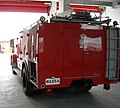History
The company was founded in 1925 when Petros Tangalakis entered into a partnership with G. Tournikiotis, a vehicle manufacturer based in Athens. In 1934, Tangalakis separated from Tournikiotis to establish his own company. During the occupation of Greece in World War II, the factory was forced to operate under German control.[ citation needed ] Regular vehicle production resumed in 1945.[ citation needed ]
In the years following World War II, the company focused on all-metal bus construction using chassis from Studebaker, Daimler, Volvo, and other manufacturers. Several models were produced; certain models underwent significant chassis modifications to support heavier loads or altered vehicle dimensions. Additionally, the company assembled Wayne models in the late 1940s and early 1950s.
In 1963, Tangalakis shifted its focus from bus to manufacturing to the production of firefighting vehicles, primarily built on International Harvester chassis assembled by Tangalakis from SKD kits. In 1965, the Tangalakis family, along with Alexandros Ginis, Fanourios Gyrtatos, and Antonis Kalogeropoulos, established TEMAX, a new company focused on the production of firefighting and other special vehicles. Another branch of the original company continued under the Tangalakis name as an importer and distributor of firefighting and rescue equipment and vehicle parts. [1]
This page is based on this
Wikipedia article Text is available under the
CC BY-SA 4.0 license; additional terms may apply.
Images, videos and audio are available under their respective licenses.









